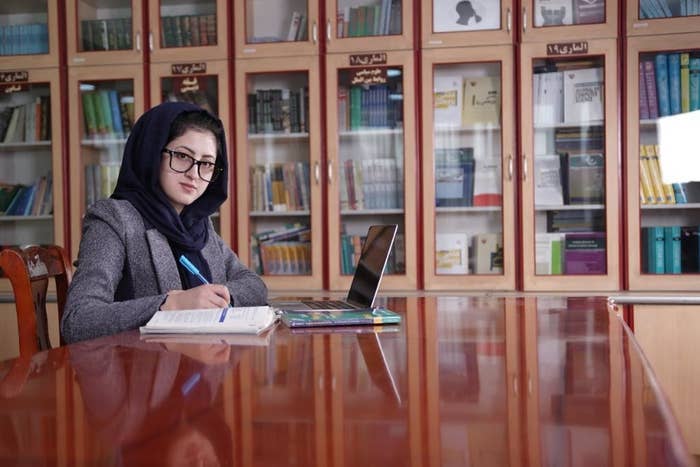
On a chilly January day in Kabul five months after the Taliban had taken over the country and began eroding a wide range of women’s rights, Parwana Ibrahimkhel and a group of other women took the streets to protest the regime’s policies. The slogan they chanted was “Bread, Work, Freedom.”
In response, the Taliban launched a crackdown to dismantle the protests. On the evening of Jan. 22, the Taliban arrested Ibrahimkhel and her brother-in-law. She spent 27 days in a Taliban military facility.
“In the beginning, the regime’s reaction was not very aggressive, but with the passage of time, it turned hostile,” Ibrahimkhel told BuzzFeed News.
Afghan women had made significant progress over the past two decades, after the Taliban were swept out of power in the early 2000s. The post-Taliban constitution, which was ratified in 2004, expanded women’s rights to go to school, vote, work, serve in civic institutions, and protest. By 2009, women were running for president for the first time in the country’s history.
From 2003 to 2017, the portion of girls enrolled in primary school rose from 10% to 33%, according to a Brookings Institute report. By 2020, 21% of Afghan civil servants were women — 16% of them in senior management — and 27% of Afghan members of parliament were women.
But now, after 20 years of democracy and billions of dollars of investments by the international community, Afghanistan’s women are back under the oppressive conditions of Taliban rule.
After taking over the country, the regime closed down schools and universities for women and girls. The regime also dissolved the Ministry of Women’s Affairs and changed it to a religious police entity that is tasked with implementing the Taliban’s new rules and guidelines. Michelle Bachelet, UN high commissioner for human rights, said that under the Taliban, hunger and food insecurity are affecting over 90% of women-headed households while a ban on secondary schooling has affected 1.2 million girls in the country.
“Today our young girls are living in a state of despair and disappointment,” Ibrahimkhel said. “The girls are totally broken and they don't see a future. A lot has changed for girls and women in Afghanistan after August 15” — the day Kabul was captured by the Taliban in 2021. “Everyone is experiencing a gradual death today.”
Ibrahimkhel and her family have paid a heavy price for staying in their country. Her father died in the war, and a suicide bombing in Kabul blinded her brother. Marching in the streets to protest the Taliban’s elimination of women’s rights was a risk she was willing to take.
“I was aware of the danger,” Ibrahimkhel said. “I had the feeling that someday something would happen to me which would be beyond my expectations. I believe that any struggle has a price and this could be detention, torture, and even murder. But I was determined to struggle.”
She was imprisoned in a nearby military facility, she said, and was unsure how long she would be incarcerated until the moment she was released four weeks later. She said she fears for her life but wanted to speak out to help raise awareness about life in Afghanistan under Taliban rule.
Following international calls for the Taliban to reopen schools for girls, the regime held a gathering of 4,000 clerics in Kabul to discuss the matter. No women or international media members were present. The meeting ended without any policy changes.
